

The last humanist: how Paul Gilroy became the most vital guide to our age of crisis. In 2000, the race equality thinktank the Runnymede Trust published a report about the “future of multi-ethnic Britain”.
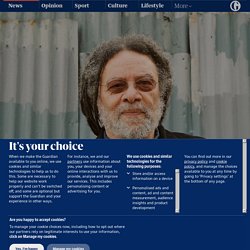
Launched by the Labour home secretary Jack Straw, it proposed ways to counter racial discrimination and rethink British identity. The report was nuanced and scholarly, the result of two years’ deliberation. It was honest about Britain’s racial inequalities and the legacy of empire, but also offered hope. It made the case for formally declaring the UK a multicultural society. The newspapers tore it to pieces. The Parekh report, as it was known – its chair was the political theorist Lord Bhikhu Parekh – was not a radical document. Gilroy watched this “depressing and deeply symptomatic” episode unfold from across the Atlantic. Get the Guardian's award-winning long reads sent direct to you every Saturday morning Gilroy, 65, has since returned to Britain. Gilroy is a worldly scholar, who wants us to look beyond the nation-state and think on a planetary scale.
Britain’s story of empire is based on myth. We need to know the truth. These days we’ve become wearily accustomed to depictions of Brexit Britain as oppressed by a villainously imperial Europe.
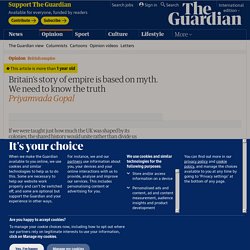
Annexed “without permission”, Nigel Farage claimed melodramatically, defending Brexit party MEPs against charges of “disrespecting” the European Parliament. In a particularly far-fetched comparison, Ann Widdecombe MEP has compared Brexit with the resistance of “slaves against their owners” and “colonies against empires”. Prime ministerial frontrunner Boris Johnson too has spoken of Britain’s supposed “colony status” in the EU though, with a familiar double standard, he also believes that it would be good if Britain was still “in charge” of Africa.
These bizarre comparisons can be made and go unchallenged because the stark fact remains that most Britons know very little about the history of the empire itself, still less the way in which its long afterlife profoundly shapes both Britain and the wider world today. Most students would welcome this move. RAF veteran ‘admitted 1961 killing of UN secretary general’ New evidence has emerged linking an RAF veteran to the death in 1961 of the UN secretary general Dag Hammarskjöld in a mysterious plane crash in southern Africa.
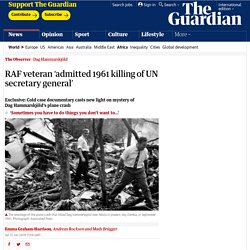
Jan van Risseghem has been named as a possible attacker before, but has always been described simply as a Belgian pilot. The Observer can now reveal that he had extensive ties to Britain, including a British mother and wife, trained with the RAF and was decorated by Britain for his service in the second world war. Film-makers investigating the 1961 crash for a documentary, Cold Case Hammarskjöld, have found a friend of Van Risseghem who claimed the pilot confessed to shooting down the UN plane. They also gathered testimony from another pilot that undermines one of his alibis for that night. Van Risseghem, whose father was Belgian, escaped occupied Europe at the start of the war to join the resistance in England. He does not believe that Van Risseghem shot down Hammarskjöld.
“He didn’t know,” Coppens said. Dag Hammarskjöld's plane may have been shot down, ambassador warned. Hours after a plane carrying the UN secretary general, Dag Hammarskjöld, crashed over central Africa in September 1961, the US ambassador to Congo sent a cable to Washington claiming that the aircraft could have been shot down by a Belgian mercenary pilot.
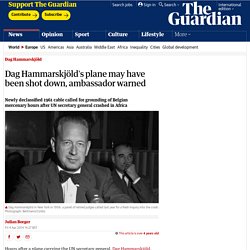
In the newly declassified document, the ambassador, Ed Gullion, does not directly implicate the Belgian or Rhodesian governments in what he calls "this operation", but calls for US pressure on them to ground the mercenary, adding it was "obviously [a] matter of highest importance". He said the pilot had been hampering UN operations and warned that if not stopped "he may paralyse air-rescue operations". The document was released after an international panel of retired judges called last year for a fresh inquiry into the Hammarskjöld crash, saying that new evidence "undoubtedly" existed. Man accused of shooting down UN chief: ‘Sometimes you have to do things you don’t want to…’ Jan van Risseghem was only a teenager when his mother ordered him to flee Nazi-occupied Belgium for her native England with his brother Maurice.
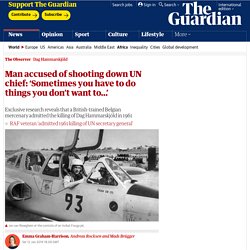
After hiding in a convent, and an epic journey across the war-torn continent, they reached safety in Portugal, then took a ship north. Once in England, the pair signed up with the Belgian resistance, and with the help of an uncle enrolled for flight training with the RAF, a decision that shaped not just their war, but the rest of their lives. Half a century later, flying skills he learned in Britain would also make the younger van Risseghem internationally notorious, when he was publicly linked to the plane crash that killed Swedish diplomat Dag Hammarskjöld, the UN secretary general, in 1961. His plane, the Albertina, came down in forest just outside the town of Ndola in present-day Zambia, then Northern Rhodesia, just after midnight on 18 September, as it approached the town’s airport.
Mining intrigue Rebel pilot Confession to a friend.